- Home
- Joseph Conrad
Chance: A Tale in Two Parts Page 3
Chance: A Tale in Two Parts Read online
Page 3
PART ONE, CHAPTER 3.
THRIFT--AND THE CHILD.
But there was nothing improper in my observing to Fyne that, last night,Mrs Fyne seemed to have some idea where that enterprising young ladyhad gone to. Fyne shook his head. No; his wife had been by no means socertain as she had pretended to be. She merely had her reasons tothink, to hope, that the girl might have taken a room somewhere inLondon, had buried herself in town--in readiness or perhaps in horror ofthe approaching day--
He ceased and sat solemnly dejected, in a brown study. "What day?" Iasked at last; but he did not hear me apparently. He diffused suchportentous gloom into the atmosphere that I lost patience with him.
"What on earth are you so dismal about?" I cried, being genuinelysurprised and puzzled. "One would think the girl was a state prisonerunder your care."
And suddenly I became still more surprised at myself, at the way I hadsomehow taken for granted things which did appear queer when one thoughtthem out.
"But why this secrecy? Why did they elope, if it is an elopement? Wasthe girl afraid of your wife? And your brother-in-law? What on earthpossesses him to make a clandestine match of it? Was he afraid of yourwife too?"
Fyne made an effort to rouse himself.
"Of course my brother-in-law, Captain Anthony, the son of..." Hechecked himself as if trying to break a bad habit. "He would bepersuaded by her. We have been most friendly to the girl!"
"She struck me as a foolish and inconsiderate little person. But whyshould you and your wife take to heart so strongly mere folly--or even awant of consideration?"
"It's the most unscrupulous action," declared Fyne weightily--andsighed.
"I suppose she is poor," I observed after a short silence. "But afterall..."
"You don't know who she is." Fyne had regained his average solemnity.
I confessed that I had not caught her name when his wife had introducedus to each other. "It was something beginning with an S--wasn't it?"And then with the utmost coolness Fyne remarked that it did not matter.The name was not her name.
"Do you mean to say that you made a young lady known to me under a falsename?" I asked, with the amused feeling that the days of wonders andportents had not passed away yet. That the eminently serious Fynesshould do such an exceptional thing was simply staggering. With a morehasty enunciation than usual little Fyne was sure that I would notdemand an apology for this irregularity if I knew what her real namewas. A sort of warmth crept into his deep tone.
"We have tried to befriend that girl in every way. She is the daughterand only child of de Barral."
Evidently he expected to produce a sensation; he kept his eyes fixedupon me prepared for some sign of it. But I merely returned hisintense, awaiting gaze. For a time we stared at each other. Consciousof being reprehensibly dense I groped in the darkness of my mind: DeBarral, De Barral--and all at once noise and light burst on me as if awindow of my memory had been suddenly flung open on a street in theCity. De Barral! But could it be the same? Surely not!
"The financier?" I suggested half incredulous.
"Yes," said Fyne; and in this instance his native solemnity of toneseemed to be strangely appropriate. "The convict."
Marlow looked at me, significantly, and remarked in an explanatory tone:
"One somehow never thought of de Barral as having any children, or anyother home than the offices of the `Orb'; or any other existence,associations or interests than financial. I see you remember thecrash..."
"I was away in the Indian Seas at the time," I said. "But of course--"
"Of course," Marlow struck in. "All the world... You may wonder at myslowness in recognising the name. But you know that my memory is merelya mausoleum of proper names. There they lie inanimate, awaiting themagic touch--and not very prompt in arising when called, either. Thename is the first thing I forget of a man. It is but just to add thatfrequently it is also the last, and this accounts for my possession of agood many anonymous memories. In de Barral's case, he got put away inmy mausoleum in company with so many names of his own creation thatreally he had to throw off a monstrous heap of grisly bones before hestood before me at the call of the wizard Fyne. The fellow had a prettyfancy in names: the `Orb' Deposit Bank, the `Sceptre' Mutual AidSociety, the `Thrift and Independence' Association. Yes, a very prettytaste in names; and nothing else besides--absolutely nothing--no othermerit. Well yes. He had another name, but that's pure luck--his ownname of de Barral which he did not invent. I don't think that a mereJones or Brown could have fished out from the depths of the Incrediblesuch a colossal manifestation of human folly as that man did. But itmay be that I am under-estimating the alacrity of human folly in risingto the bait. No doubt I am. The greed of that absurd monster isincalculable, unfathomable, inconceivable. The career of de Barraldemonstrates that it will rise to a naked hook. He didn't lure it witha fairy-tale. He hadn't enough imagination for it..."
"Was he a foreigner?" I asked. "It's clearly a French name. I supposeit _was_ his name?"
"Oh, he didn't invent it. He was born to it, in Bethnal Green, as itcame out during the proceedings. He was in the habit of alluding to hisScotch connections. But every great man has done that. The mother, Ibelieve, was Scotch, right enough. The father de Barral whatever hisorigins retired from the Customs Service (tide-waiter I think), andstarted lending money in a very, very small way in the East-End topeople connected with the docks, stevedores, minor barge-owners,ship-chandlers, tally clerks, all sorts of very small fry. He made hisliving at it. He was a very decent man I believe. He had enoughinfluence to place his only son as junior clerk in the accountdepartment of one of the Dock Companies. `Now, my boy,' he said to him,`I've given you a fine start.' But de Barral didn't start. He stuck.He gave perfect satisfaction. At the end of three years he got a smallrise of salary and went out courting in the evenings. He went courtingthe daughter of an old sea-captain who was a churchwarden of his parishand lived in an old badly preserved Georgian house with a garden: one ofthese houses standing in a reduced bit of `grounds' that you discover ina labyrinth of the most sordid streets, exactly alike and composed ofsix-roomed hutches."
Some of them were the vicarages of slum parishes. The old sailor hadgot hold of one cheap, and de Barral got hold of his daughter--which wasa good bargain for him. The old sailor was very good to the youngcouple and very fond of their little girl. Mrs de Barral was anequable, unassuming woman, at that time. With a fund of simple gaiety,and with no ambitions; but, woman-like, she longed for change and forsomething interesting to happen now and then. It was she who encouragedde Barral to accept the offer of a post in the west-end branch of agreat bank. It appears he shrank from such a great adventure for a longtime. At last his wife's arguments prevailed. Later on she used tosay: "It's the only time he ever listened to me; and I wonder now if ithadn't been better for me to die before I ever made him go into thatbank."
You may be surprised at my knowledge of these details. Well, I had themultimately from Mrs Fyne. Mrs Fyne while yet Miss Anthony, in herdays of bondage, knew Mrs de Barral in her days of exile. Mrs deBarral was living then in a big stone mansion with mullioned windows ina large damp park, called the Priory, adjoining the village where therefined poet had built himself a house.
These were the days of de Barral's success. He had bought the placewithout ever seeing it and had packed off his wife and child at oncethere to take possession. He did not know what to do with them inLondon. He himself had a suite of rooms in an hotel. He gave theredinner parties followed by cards in the evening. He had developed thegambling passion--or else a mere card mania--but at any rate he playedheavily, for relaxation, with a lot of dubious hangers on.
Meantime Mrs de Barral, expecting him every day, lived at the Priory,with a carriage and pair, a governess for the child and many servants.The village people would see her through the railings wandering underthe trees with her little girl lost in her strange surroundings.
Nobodyever came near her. And there she died as some faithful and delicateanimals die--from neglect, absolutely from neglect, rather unexpectedlyand without any fuss. The village was sorry for her because, thoughobviously worried about something, she was good to the poor and wasalways ready for a chat with any of the humble folks. Of course theyknew that she wasn't a lady--not what you would call a real lady. Andeven her acquaintance with Miss Anthony was only a cottage door, avillage-street acquaintance. Carleon Anthony was a tremendousaristocrat (his father had been a "restoring" architect) and hisdaughter was not allowed to associate with anyone but the county youngladies. Nevertheless in defiance of the poet's wrathful concern forundefiled refinement there were some quiet, melancholy strolls to andfro in the great avenue of chestnuts leading to the park-gate, duringwhich Mrs de Barral came to call Miss Anthony "my dear"--and even "mypoor dear." The lonely soul had no one to talk to but that not veryhappy girl. The governess despised her. The housekeeper was distant inher manner. Moreover Mrs de Barral was no foolish gossiping woman.But she made some confidences to Miss Anthony. Such wealth was aterrific thing to have thrust upon one she affirmed. Once she went sofar as to confess that she was dying with anxiety. Mr de Barral (soshe referred to him) had been an excellent husband and an exemplaryfather but "you see my dear I have had a great experience of him. I amsure he won't know what to do with all that money people are giving tohim to take care of for them. He's as likely as not to do somethingrash. When he comes here I must have a good long serious talk with him,like the talks we often used to have together in the good old times ofour life." And then one day a cry of anguish was wrung from her: "Mydear, he will never come here, he will never, never come!"
She was wrong. He came to the funeral, was extremely cut up, andholding the child tightly by the hand wept bitterly at the side of thegrave. Miss Anthony, at the cost of a whole week of sneers and abusefrom the poet, saw it all with her own eyes. De Barral clung to thechild like a drowning man. He managed, though, to catch the half-pastfive fast train, travelling to town alone in a reserved compartment,with all the blinds down...
"Leaving the child?" I said interrogatively.
"Yes. Leaving--He shirked the problem. He was born that way. He hadno idea what to do with her or for that matter with anything or anybodyincluding himself. He bolted back to his suite of rooms in the hotel.He was the most helpless ... She might have been left in the Priory tothe end of time had not the high-toned governess threatened to send inher resignation. She didn't care for the child a bit, and the lonely,gloomy Priory had got on her nerves. She wasn't going to put up withsuch a life and, having just come out of some ducal family, she bulliedde Barral in a very lofty fashion. To pacify her he took a splendidlyfurnished house in the most expensive part of Brighton for them, and nowand then ran down for a week-end, with a trunk full of exquisite sweetsand with his hat full of money. The governess spent it for him in extraducal style. She was nearly forty and harboured a secret taste forpatronising young men of sorts--of a certain sort. But of that MrsFyne of course had no personal knowledge then; she told me however thateven in the Priory days she had suspected her of being an artificial,heartless, vulgar-minded woman with the lowest possible-ideals. But deBarral did not know it. He literally did not know anything..."
"But tell me, Marlow," I interrupted, "how do you account for thisopinion? He must have been a personality in a sense--in some one sensesurely. You don't work the greatest material havoc of a decade atleast, in a commercial community, without having something in you."
Marlow shook his head.
"He was a mere sign, a portent. There was nothing in him. Just aboutthat time the word Thrift was to the fore. You know the power of words.We pass through periods dominated by this or that word--it may bedevelopment, or it may be competition, or education, or purity orefficiency or even sanctity. It is the word of the time. Well justthen it was the word Thrift which was out in the streets walking arm inarm with righteousness, the inseparable companion and backer up of allsuch national catch-words, looking everybody in the eye as it were. Thevery drabs of the pavement, poor things, didn't escape thefascination... However! ... Well the greatest portion of the presswere screeching in all possible tones, like a confounded company ofparrots instructed by some devil with a taste for practical jokes, thatthe financier de Barral was helping the great moral evolution of ourcharacter towards the newly-discovered virtue of Thrift. He was helpingit by all these great establishments of his, which made the moral meritsof Thrift manifest to the most callous hearts, simply by promising topay ten per cent, interest on all deposits. And you didn't wantnecessarily to belong to the well-to-do classes in order to participatein the advantages of virtue. If you had but a spare sixpence in theworld and went and gave it to de Barral it was Thrift! It's quitelikely that he himself believed it. He must have. It's inconceivablethat he alone should stand out against the infatuation of the wholeworld. He hadn't enough intelligence for that. But to look at him onecouldn't tell..."
"You did see him then?" I said with some curiosity.
"I did. Strange, isn't it? It was only once, but as I sat with thedistressed Fyne who had suddenly resuscitated his name buried in mymemory with other dead labels of the past, I may say I saw him again, Isaw him with great vividness of recollection, as he appeared in the daysof his glory or splendour. No! Neither of these words will fit hissuccess. There was never any glory or splendour about that figure.Well, let us say in the days when he was, according to the majority ofthe daily press, a financial force working for the improvement of thecharacter of the people. I'll tell you how it came about."
At that time I used to know a podgy, wealthy, bald little man havingchambers in the Albany; a financier too, in his way, carrying outtransactions of an intimate nature and of no moral character; mostlywith young men of birth and expectations--though I dare say he didn'twithhold his ministrations from elderly plebeians either. He was a truedemocrat; he would have done business (a sharp kind of business) withthe devil himself. Everything was fly that came into his web. Hereceived the applicants in an alert, jovial fashion which was quitesurprising. It gave relief without giving too much confidence, whichwas just as well perhaps. His business was transacted in an apartmentfurnished like a drawing-room, the walls hung with several brown,heavily-framed, oil paintings. I don't know if they were good, but theywere big, and with their elaborate, tarnished gilt-frames had amelancholy dignity. The man himself sat at a shining, inlaid writingtable which looked like a rare piece from a museum of art; his chair hada high, oval, carved back, upholstered in faded tapestry; and theseobjects made of the costly black Havana cigar, which he rolledincessantly from the middle to the left corner of his mouth and backagain, an inexpressibly cheap and nasty object. I had to see himseveral times in the interest of a poor devil so unlucky that he didn'teven have a more competent friend than myself to speak for him at a verydifficult time in his life.
I don't know at what hour my private financier began his day, but heused to give one appointments at unheard of times: such as a quarter toeight in the morning, for instance. On arriving one found him busy atthat marvellous writing table, looking very fresh and alert, exhaling afaint fragrance of scented soap and with the cigar already well alight.You may believe that I entered on my mission with many unpleasantforebodings; but there was in that fat, admirably washed, little mansuch a profound contempt for mankind that it amounted to a species ofgood nature; which, unlike the milk of genuine kindness, was never indanger of turning sour. Then, once, during a pause in business, whilewe were waiting for the production of a document for which he had sent(perhaps to the cellar?) I happened to remark, glancing round the room,that I had never seen so many fine things assembled together out of acollection. Whether this was unconscious diplomacy on my part, or not,I shouldn't like to say--but the remark was true enough, and it pleasedhim extremely. "It _is_ a collection," he said emphatically. "Only Ilive right in it, which most coll
ectors don't. But I see that you knowwhat you are looking at. Not many people who come here on business do.Stable fittings are more in their way."
I don't know whether my appreciation helped to advance my friend'sbusiness but at any rate it helped our intercourse. He treated me witha shade of familiarity as one of the initiated.
The last time I called on him to conclude the transaction we wereinterrupted by a person, something like a cross between a bookmaker anda private secretary, who, entering through a door which was not theanteroom door, walked up and stooped to whisper into his ear.
"Eh? What? Who, did you say?"
The nondescript person stooped and whispered again, adding a littlelouder: "Says he won't detain you a moment."
My little man glanced at me, said "Ah! Well," irresolutely. I got upfrom my chair and offered to come again later. He looked whimsicallyalarmed. "No, no. It's bad enough to lose my money but I don't want towaste any more of my time over your friend. We must be done with thisto-day. Just go and have a look at that _garniture de cheminee_ yonder.There's another, something like it, in the castle of Laeken, but mine'smuch superior in design."
I moved accordingly to the other side of that big room. The _garniture_was very fine. But while pretending to examine it I watched my mangoing forward to meet a tall visitor, who said, "I thought you would bedisengaged so early. It's only a word or two"--and after a whisperedconfabulation of no more than a minute, reconduct him to the door andshake hands ceremoniously. "Not at all, not at all. Very pleased to beof use. You can depend absolutely on my information"--"Oh thank you,thank you. I just looked in."
"Certainly, quite right. Any time... Good morning."
I had a good look at the visitor while they were exchanging thesecivilities. He was clad in black. I remember perfectly that he wore aflat, broad, black satin tie in which was stuck a large cameo pin; and asmall turn down collar. His hair, discoloured and silky, curledslightly over his ears. His cheeks were hairless and round, andapparently soft. He held himself very upright, walked with small stepsand spoke gently in an inward voice. Perhaps from contrast with themagnificent polish of the room and the neatness of its owner, he struckme as dingy, indigent, and, if not exactly humble, then much subdued byevil fortune.
I wondered greatly at my fat little financier's civility to that dubiouspersonage when he asked me, as we resumed our respective seats, whetherI knew who it was that had just gone out. On my shaking my headnegatively he smiled queerly, said "De Barral," and enjoyed my surprise.Then becoming grave: "That's a deep fellow, if you like. We all knowwhere he started from and where he got to; but nobody knows what hemeans to do." He became thoughtful for a moment and added as ifspeaking to himself, "I wonder what his game is."
And, you know, there was no game, no game of any sort, or shape or kind.It came out plainly at the trial. As I've told you before, he was aclerk in a bank, like thousands of others. He got that berth as asecond start in life and there he stuck again, giving perfectsatisfaction. Then one day as though a supernatural voice had whisperedinto his ear or some invisible fly had stung him, he put on his hat,went out into the street and began advertising. That's absolutely allthat there was to it. He caught in the street the word of the time andharnessed it to his preposterous chariot.
One remembers his first modest advertisements headed with the magic wordThrift, Thrift, Thrift, thrice repeated; promising ten per cent, on alldeposits and giving the address of the Thrift and Independence AidAssociation in Vauxhall Bridge Road. Apparently nothing more wasnecessary. He didn't even explain what he meant to do with the money heasked the public to pour into his lap. Of course he meant to lend itout at high rates of interest. He did so--but he did it without system,plan, foresight or judgment. And as he frittered away the sums thatflowed in, he advertised for more--and got it. During a period ofgeneral business prosperity he set up The Orb Bank and The SceptreTrust, simply, it seems for advertising purposes. They were mere names.He was totally unable to organise anything, to promote any sort ofenterprise if it were only for the purpose of juggling with the shares.At that time he could have had for the asking any number of Dukes,retired Generals, active M.P.'s, ex-ambassadors and so on as Directorsto sit at the wildest boards of his invention. But he never tried. Hehad no real imagination. All he could do was to publish moreadvertisements and open more branch offices of the Thrift andIndependence, of The Orb, of The Sceptre, for the receipt of deposits;first in this town, then in that town, north and south--everywhere wherehe could find suitable premises at a moderate rent. For this was thegreat characteristic of the management. Modesty, moderation,simplicity. Neither The Orb nor The Sceptre nor yet their parent theThrift and Independence had built for themselves the usual palaces. Forthis abstention they were praised in silly public prints as illustratingin their management the principle of Thrift for which they were founded.The fact is that de Barral simply didn't think of it. Of course he hadsoon moved from Vauxhall Bridge Road. He knew enough for that. What hegot hold of next was an old, enormous, rat-infested brick house in asmall street off the Strand. Strangers were taken in front of themeanest possible, begrimed, yellowy, flat brick wall, with two rows ofunadorned window-holes one above the other, and were exhorted with batedbreath to behold and admire the simplicity of the head-quarters of thegreat financial force of the day. The word thrift perched right up onthe roof in giant gilt letters, and two enormous shield-likebrass-plates curved round the corners on each side of the doorway werethe only shining spots in de Barral's business outfit. Nobody knew whatoperations were carried on inside except this--that if you walked in andtendered your money over the counter it would be calmly taken from youby somebody who would give you a printed receipt. That and no more. Itappears that such knowledge is irresistible. People went in andtendered; and once it was taken from their hands their money was moreirretrievably gone from them than if they had thrown it into the sea.This then, and nothing else was being carried on in there...
"Come, Marlow," I said, "you exaggerate surely--if only by your way ofputting things. It's too startling."
"I exaggerate!" he defended himself. "My way of putting things! Mydear fellow I have merely stripped the rags of business verbiage andfinancial jargon off my statements. And you are startled! I am givingyou the naked truth. It's true too that nothing lays itself open to thecharge of exaggeration more than the language of naked truth. Whatcomes with a shock is admitted with difficulty. But what will you sayto the end of his career?"
It was of course sensational and tolerably sudden. It began with theOrb Deposit Bank. Under the name of that institution de Barral with thefrantic obstinacy of an unimaginative man had been financing an Indianprince who was prosecuting a claim for immense sums of money against thegovernment. It was an enormous number of scores of lakhs--a miserableremnant of his ancestors' treasures--that sort of thing. And it was allauthentic enough. There was a real prince; and the claim too wassufficiently real--only unfortunately it was not a valid claim. So theprince lost his case on the last appeal and the beginning of de Barral'send became manifest to the public in the shape of a half-sheet of notepaper watered by the four corners on the closed door of The Orb officesnotifying that payment was stopped at that establishment.
Its consort The Sceptre collapsed within the week. I won't say inAmerican parlance that suddenly the bottom fell out of the whole of deBarral concerns. There never had been any bottom to it. It was likethe cask of Danaides into which the public had been pleased to pour itsdeposits. That they were gone was clear; and the bankruptcy proceedingswhich followed were like a sinister farce, bursts of laughter in asetting of mute anguish--that of the depositors; hundreds of thousandsof them. The laughter was irresistible; the accompaniment of thebankrupt's public examination.
I don't know if it was from utter lack of all imagination or from thepossession in undue proportion of a particular kind of it, or fromboth--and the three alternatives are possible--but it was dis
coveredthat this man who had been raised to such a height by the credulity ofthe public was himself more gullible than any of his depositors. He hadbeen the prey of all sorts of swindlers, adventurers, visionaries andeven lunatics. Wrapping himself up in deep and imbecile secrecy he hadgone in for the most fantastic schemes: a harbour and docks on the coastof Patagonia, quarries in Labrador--such like speculations. Fisheriesto feed a canning Factory on the banks of the Amazon was one of them. Aprincipality to be bought in Madagascar was another. As the grotesquedetails of these incredible transactions came out one by one ripples oflaughter ran over the closely packed court--each one a little louderthan the other. The audience ended by fairly roaring under thecumulative effect of absurdity. The Registrar laughed, the barristerslaughed, the reporters laughed, the serried ranks of the miserabledepositors watching anxiously every word, laughed like one man. Theylaughed hysterically--the poor wretches--on the verge of tears.
There was only one person who remained unmoved. It was de Barralhimself. He preserved his serene, gentle, expression, I am told (for Ihave not witnessed those scenes myself), and looked around at the peoplewith an air of placid sufficiency which was the first hint to the worldof the man's overweening, immeasurable conceit, hidden hitherto under adiffident manner. It could be seen too in his dogged assertion that ifhe had been given enough time and a lot more money everything would havecome right. And there were some people (yes, amongst his very victims)who more than half believed him, even after the criminal prosecutionwhich soon followed. When placed in the dock he lost his steadiness asif some sustaining illusion had gone to pieces within him suddenly. Heceased to be himself in manner completely, and even in disposition, inso far that his faded neutral eyes matching his discoloured hair sowell, were discovered then to be capable of expressing a sort ofunderhand hate. He was at first defiant, then insolent, then broke downand burst into tears; but it might have been from rage. Then he calmeddown, returned to his soft manner of speech and to that unassuming quietbearing which had been usual with him even in his greatest days. But itseemed as though in this moment of change he had at last perceived whata power he had been; for he remarked to one of the prosecuting counselwho had assumed a lofty moral tone in questioning him, that--yes, he hadgambled--he liked cards. But that only a year ago a host of smartpeople would have been only too pleased to take a hand at cards withhim. Yes--he went on--some of the very people who were thereaccommodated with seats on the bench; and turning upon the counsel, "Youyourself as well," he cried. He could have had half the town at hisrooms to fawn upon him if he had cared for that sort of thing. "Why,now I think of it, it took me most of my time to keep people, just ofyour sort, off me," he ended with a good humoured--quite unobtrusive,contempt, as though the fact had dawned upon him for the first time.
This was the moment, the only moment, when he had perhaps all theaudience in Court with him, in a hush of dreary silence. And then thedreary proceedings were resumed. For all the outside excitement it wasthe most dreary of all celebrated trials. The bankruptcy proceedingshad exhausted all the laughter there was in it. Only the fact ofwide-spread ruin remained; and the resentment of a mass of people forhaving been fooled by means too simple to save their self-respect from adeep wound which the cleverness of a consummate scoundrel would not haveinflicted. A shamefaced amazement attended these proceedings in whichde Barral was not being exposed alone. For himself his only cry was:Time! Time! Time would have set everything right. In time some ofthese speculations of his were certain to have succeeded. He repeatedthis defence, this excuse, this confession of faith, with wearisomeiteration. Everything he had done or left undone had been to gain time.He had hypnotised himself with the word. Sometimes, I am told, hisappearance was ecstatic, his motionless pale eyes seemed to be gazingdown the vista of future ages. Time--and of course, more money. "Ah!If only you had left me alone for a couple of years more," he cried oncein accents of passionate belief. "The money was coming in all right."The deposits you understand--the savings of Thrift. Oh yes they hadbeen coming in to the very last moment. And he regretted them. He hadarrived to regard them as his own by a sort of mystical persuasion. Andyet it was a perfectly true cry, when he turned once more on the counselwho was beginning a question with the words "You have had all theseimmense sums..." with the indignant retort "_What_ have I had out ofthem?"
"It was perfectly true. He had had nothing out of them--nothing of theprestigious or the desirable things of the earth, craved for bypredatory natures. He had gratified no tastes, had known no luxury; hehad built no gorgeous palaces, had formed no splendid galleries out ofthese `immense sums.' He had not even a home. He had gone into theserooms in an hotel and had stuck there for years, giving no doubt perfectsatisfaction to the management. They had twice raised his rent to showI suppose their high sense of his distinguished patronage. He hadbought for himself out of all the wealth streaming through his fingersneither adulation nor love, neither splendour nor comfort. There wassomething perfect in his consistent mediocrity. His very vanity seemedto miss the gratification of even the mere show of power. In the dayswhen he was most fully in the public eye the invincible obscurity of hisorigins clung to him like a shadowy garment. He had handled millionswithout ever enjoying anything of what is counted as precious in thecommunity of men, because he had neither the brutality of temperamentnor the fineness of mind to make him desire them with the will power ofa masterful adventurer..."
"You seem to have studied the man," I observed.
"Studied," repeated Marlow thoughtfully. "No! Not studied. I had noopportunities. You know that I saw him only on that one occasion I toldyou of. But may be that a glimpse and no more is the proper way ofseeing an individuality; and de Barral was that, in virtue of his verydeficiencies for they made of him something quite unlike one'spreconceived ideas. There were also very few materials accessible to aman like me to form a judgment from. But in such a case I verilybelieve that a little is as good as a feast--perhaps better. If one hasa taste for that kind of thing the merest starting-point becomes a coignof vantage, and then by a series of logically deducted verisimilitudesone arrives at truth--or very near the truth--as near as anycircumstantial evidence can do. I have not studied de Barral but thatis how I understand him so far as he could be understood through the dinof the crash; the wailing and gnashing of teeth, the newspaper contentsbills, `The Thrift Frauds. Cross-examination of the accused. Extraspecial'--blazing fiercely; the charitable appeals for the victims, thegrave tones of the dailies rumbling with compassion as if they were thenational bowels. All this lasted a whole week of industrious sittings.A pressman whom I knew told me, `He's an idiot.' Which was possible.Before that I overheard once somebody declaring that he had a criminaltype of face; which I knew was untrue. The sentence was pronounced byartificial light in a stifling poisonous atmosphere. Something edifyingwas said by the judge weightily, about the retribution overtaking theperpetrator of `the most heartless frauds on an unprecedented scale.' Idon't understand these things much, but it appears that he had juggledwith accounts, cooked balance sheets, had gathered in deposits monthsafter he ought to have known himself to be hopelessly insolvent, anddone enough of other things, highly reprehensible in the eyes of thelaw, to earn for himself seven years' penal servitude. The sentencemaking its way outside met with a good reception. A small mob composedmainly of people who themselves did not look particularly clever andscrupulous, leavened by a slight sprinkling of genuine pickpocketsamused itself by cheering in the most penetrating, abominable colddrizzle that I remember. I happened to be passing there on my way fromthe East-End where I had spent my day about the Docks with an old chumwho was looking after the fitting out of a new ship. I am always eager,when allowed, to call on a new ship. They interest me like charmingyoung persons."
I got mixed up in that crowd seething with an animosity as senseless asthings of the street always are, and it was while I was laboriouslymaking my way out of it that the pressma
n of whom I spoke was jostledagainst me. He did me the justice to be surprised. "What? You here!The last person in the world--If I had known I could have got youinside. Plenty of room. Interest been over for the last three days.Got seven years. Well, I am glad."
"Why are you glad? Because he's got seven years?" I asked, greatlyincommoded by the pressure of a hulking fellow who was remarking to someof his equally oppressive friends that the "beggar ought to have beenpole-axed." I don't know whether he had ever confided his savings to deBarral but if so, judging from his appearance, they must have been theproceeds of some successful burglary. The pressman by my side said`No,' to my question. He was glad because it was all over. He hadsuffered greatly from the heat and the bad air of the court. Theclammy, raw, chill of the streets seemed to affect his liver instantly.He became contemptuous and irritable and plied his elbows viciouslymaking way for himself and me.
A dull affair this. All such cases were dull. No really dramaticmoments. The book-keeping of The Orb and all the rest of them wascertainly a burlesque revelation but the public did not care forrevelations of that kind. Dull dog that de Barral--he grumbled. Hecould not or would not take the trouble to characterise for me theappearance of that man now officially a criminal (we had gone across theroad for a drink) but told me with a sourly, derisive snigger that,after the sentence had been pronounced the fellow clung to the dock longenough to make a sort of protest. `You haven't given me time. If I hadbeen given time I would have ended by being made a peer like some ofthem.' And he had permitted himself his very first and last gesture inall these days, raising a hard-clenched fist above his head.
"The pressman disapproved of that manifestation. It was not hisbusiness to understand it. Is it ever the business of any pressman tounderstand anything? I guess not. It would lead him too far away fromthe actualities which are the daily bread of the public mind. Heprobably thought the display worth very little from a picturesque pointof view; the weak voice, the colourless personality as incapable of anattitude as a bed-post, the very fatuity of the clenched hand soineffectual at that time and place--no, it wasn't worth much. And then,for him, an accomplished craftsman in his trade, thinking was distinctly`bad business.' His business was to write a readable account. But Iwho had nothing to write, I permitted myself to use my mind as we satbefore our still untouched glasses. And the disclosure which so oftenrewards a moment of detachment from mere visual impressions gave me athrill very much approaching a shudder. I seemed to understand that,with the shock of the agonies and perplexities of his trial, theimagination of that man, whose moods, notions and motives worefrequently an air of grotesque mystery--that his imagination had been atlast roused into activity. And this was awful. Just try to enter intothe feelings of a man whose imagination wakes up at the very moment heis about to enter the tomb..."
"You must not think," went on Marlow after a pause, "that on thatmorning with Fyne I went consciously in my mind over all this, let uscall it information; no, better say, this fund of knowledge which I had,or rather which existed, in me in regard to de Barral. Information issomething one goes out to seek and puts away when found as you might doa piece of lead: ponderous, useful, unvibrating, dull. Whereasknowledge comes to one, this sort of knowledge, a chance acquisitionpreserving in its repose a fine resonant quality... But as suchdistinctions touch upon the transcendental I shall spare you the pain oflistening to them. There are limits to my cruelty. No! I didn'treckon up carefully in my mind all this I have been telling you. Howcould I have done so, with Fyne right there in the room? He satperfectly still, statuesque in homely fashion, after having deliveredhimself of his effective assent: `Yes. The convict,' and I, far fromindulging in a reminiscent excursion into the past, remainedsufficiently in the present to muse in a vague, absent-minded way on therespectable proportions and on the (upon the whole) comely shape of hisgreat pedestrian's calves, for he had thrown one leg over his knee,carelessly, to conceal the trouble of his mind by an air of ease. Butall the same the knowledge was in me, the awakened resonance of which Ispoke just now; I was aware of it on that beautiful day, so fresh, sowarm and friendly, so accomplished--an exquisite courtesy of the muchabused English climate when it makes up its meteorological mind tobehave like a perfect gentleman. Of course the English climate is nevera rough. It suffers from spleen somewhat frequently--but that isgentlemanly too, and I don't mind going to meet him in that mood. Hehas his days of grey, veiled, polite melancholy, in which he is veryfascinating. How seldom he lapses into a blustering manner, after all!And then it is mostly in a season when, appropriately enough, one may goout and kill something. But his fine days are the best for stopping athome, to read, to think, to muse--even to dream; in fact to live fully,intensely and quietly, in the brightness of comprehension, in thatreceptive glow of the mind, the gift of the clear, luminous and sereneweather."
That day I had intended to live intensely and quietly, basking in theweather's glory which would have lent enchantment to the mostunpromising of intellectual prospects. For a companion I had found abook, not bemused with the cleverness of the day--a fine-weather book,simple and sincere like the talk of an unselfish friend. But looking atlittle Fyne seated in the room I understood that nothing would come ofmy contemplative aspirations; that in one way or another I should be letin for some form of severe exercise. Walking, it would be, I feared,since, for me, that idea was inseparably associated with the visualimpression of Fyne. Where, why, how, a rapid striding rush could bebrought in helpful relation to the good Fyne's present trouble andperplexity I could not imagine; except on the principle that senselesspedestrianism was Fyne's panacea for all the ills and evils bodily andspiritual of the universe. It could be of no use for me to say or doanything. It was bound to come. Contemplating his muscular limbencased in a golf-stocking, and under the strong impression of theinformation he had just imparted I said wondering, rather irrationally:
"And so de Barral had a wife and child! That girl's his daughter. Andhow..."
Fyne interrupted me by stating again earnestly, as though it weresomething not easy to believe, that his wife and himself had tried tobefriend the girl in every way--indeed they had! I did not doubt himfor a moment, of course, but my wonder at this was more rational. Atthat hour of the morning, you mustn't forget, I knew nothing as yet ofMrs Fyne's contact (it was hardly more) with de Barral's wife and childduring their exile at the Priory, in the culminating days of that man'sfame.
Fyne who had come over, it was clear, solely to talk to me on thatsubject, gave me the first hint of this initial, merely out of doors,connection. "The girl was quite a child then," he continued. "Later onshe was removed out of Mrs Fyne's reach in charge of a governess--avery unsatisfactory person," he explained. His wife had then--h'm--methim; and on her marriage she lost sight of the child completely. Butafter the birth of Polly (Polly was the third Fyne girl) she did not geton very well, and went to Brighton for some months to recover herstrength--and there, one day in the street, the child (she wore her hairdown her back still) recognised her outside a shop and rushed, actuallyrushed, into Mrs Fyne's arms. Rather touching this. And so,disregarding the cold impertinence of that ... h'm ... governess, hiswife naturally responded.
He was solemnly fragmentary. I broke in with the observation that itmust have been before the crash.
Fyne nodded with deepened gravity, stating in his bass tone.
"Just before," and indulged himself with a weighty period of solemnsilence.
De Barral, he resumed suddenly, was not coming to Brighton for weekendsregularly, then. Must have been conscious already of the approachingdisaster. Mrs Fyne avoided being drawn into making his acquaintance,and this suited the views of the governess person, very jealous of anyoutside influence. But in any case it would not have been an easymatter. Extraordinary, stiff-backed, thin figure all in black, theobserved of all, while walking hand-in-hand with the girl; apparentlyshy, but--and here Fyne came very near showing something like
insight--probably nursing under a diffident manner a considerable amount ofsecret arrogance. Mrs Fyne pitied Flora de Barral's fate long beforethe catastrophe. Most unfortunate guidance. Very unsatisfactorysurroundings. The girl was known in the streets, was stared at inpublic places as if she had been a sort of princess, but she was keptwith a very ominous consistency, from making any acquaintances--thoughof course there were many people no doubt who would have been more thanwilling to--h'm--make themselves agreeable to Miss de Barral. But thisdid not enter into the plans of the governess, an intriguing personhatching a most sinister plot under her severe air of distant,fashionable exclusiveness. Good little Fyne's eyes bulged with solemnhorror as he revealed to me, in agitated speech, his wife's more thansuspicions, at the time, of that, Mrs--Mrs What's her name'sperfidious conduct. She actually seemed to have--Mrs Fyne asserted--formed a plot already to marry eventually her charge to an impecuniousrelation of her own--a young man with furtive eyes and somethingimpudent in his manner, whom that woman called her nephew, and whom shewas always having down to stay with her.
"And perhaps not her nephew. No relation at all"--Fyne emitted with aconvulsive effort this, the most awful part of the suspicions Mrs Fyneused to impart to him piecemeal when he came down to spend his weekendsgravely with her and the children. The Fynes, in their good-naturedconcern for the unlucky child of the man busied in stirring casually somany millions, spent the moments of their weekly reunion in wonderingearnestly what could be done to defeat the most wicked of conspiracies,trying to invent some tactful line of conduct in such extraordinarycircumstances. I could see them, simple, and scrupulous, worryinghonestly about that unprotected big girl while looking at their ownlittle girls playing on the sea-shore. Fyne assured me that his wife'srest was disturbed by the great problem of interference.
"It was very acute of Mrs Fyne to spot such a deep game," I said,wondering to myself where her acuteness had gone to now, to let her betaken unawares by a game so much simpler and played to the end under hervery nose. But then, at that time, when her nightly rest was disturbedby the dread of the fate preparing for de Barral's unprotected child,she was not engaged in writing a compendious and ruthless hand-book onthe theory and practice of life, for the use of women with a grievance.She could as yet, before the task of evolving the philosophy ofrebellious action had affected her intuitive sharpness, perceive thingswhich were, I suspect, moderately plain. For I am inclined to believethat the woman whom chance had put in command of Flora de Barral'sdestiny took no very subtle pains to conceal her game. She wasconscious of being a complete master of the situation, having once forall established her ascendancy over de Barral. She had taken all hermeasures against outside observation of her conduct; and I could nothelp smiling at the thought what a ghastly nuisance the serious,innocent Fynes must have been to her. How exasperated she must havebeen by that couple falling into Brighton as completely unforeseen as abolt from the blue--if not so prompt. How she must have hated them!
But I conclude she would have carried out whatever plan she might haveformed. I can imagine de Barral accustomed for years to defer to herwishes and, either through arrogance, or shyness, or simply because ofhis unimaginative stupidity, remaining outside the social pale, knowingno one but some card-playing cronies; I can picture him to myselfterrified at the prospect of having the care of a marriageable girlthrust on his hands, forcing on him a complete change of habits and thenecessity of another kind of existence which he would not even haveknown how to begin. It is evident to me that Mrs What's her name wouldhave had her atrocious way with very little trouble even if theexcellent Fynes had been able to do something. She would simply havebullied de Barral in a lofty style. There's nothing more subservientthan an arrogant man when his arrogance has once been broken in someparticular instance.
However there was no time and no necessity for any one to do anything.The situation itself vanished in the financial crash as a buildingvanishes in an earthquake--here one moment and gone the next with onlyan ill-omened, slight, preliminary rumble. Well, to say `in a moment'is an exaggeration perhaps; but that everything was over in justtwenty-four hours is an exact statement. Fyne was able to tell me allabout it; and the phrase that would depict the nature of the change bestis: an instant and complete destitution. I don't understand thesematters very well, but from Fyne's narrative it seemed as if thecreditors or the depositors, or the competent authorities, had got holdin the twinkling of an eye of everything de Barral possessed in theworld, down to his watch and chain, the money in his trousers' pocket,his spare suits of clothes, and I suppose the cameo pin out of his blacksatin cravat. Everything! I believe he gave up the very wedding ringof his late wife. The gloomy Priory with its damp park and a couple offarms had been made over to Mrs de Barral; but when she died (withoutmaking a will) it reverted to him, I imagine. They got that of course;but it was a mere crumb in a Sahara of starvation, a drop in the thirstyocean. I dare say that not a single soul in the world got the comfortof as much as a recovered threepenny bit out of the estate. Then, lessthan crumbs, less than drops, there were to be grabbed, the lease of thebig Brighton house, the furniture therein, the carriage and pair, thegirl's riding horse, her costly trinkets; down to the heavilygold-mounted collar of her pedigree Saint Bernard. The dog too went:the most noble-looking item in the beggarly assets.
What however went first of all or rather vanished was nothing in thenature of an asset. It was that plotting governess with the trick of a"perfect lady" manner (severely conventional) and the soul of aremorseless brigand. When a woman takes to any sort of unlawfulman-trade, there's nothing to beat her in the way of thoroughness. It'strue that you will find people who'll tell you that this terrificvirulence in breaking through all established things, is altogether thefault of men. Such people will ask you with a clever air why theservile wars were always the most fierce, desperate and atrocious of allwars. And you may make such answer as you can--even the eminentlyfeminine one, if you choose, so typical of the women's literal mind. "Idon't see what this has to do with it!" How many arguments have beenknocked over (I won't say knocked down) by these few words! For if wemen try to put the spaciousness of all experiences into our reasoningand would fain put the Infinite itself into our love, it isn't, as somewriter has remarked, "It isn't women's doing." Oh no. They don't carefor these things. That sort of aspiration is not much in their way; andit shall be a funny world, the world of their arranging, where theIrrelevant would fantastically step in to take the place of the soberhumdrum Imaginative...
I raised my hand to stop my friend Marlow.
"Do you really believe what you have said?" I asked, meaning nooffence, because with Marlow one never could be sure.
"Only on certain days of the year," said Marlow readily with a malicioussmile. "To-day I have been simply trying to be spacious and I perceiveI've managed to hurt your susceptibilities which are consecrated towomen. When you sit alone and silent you are defending in your mind thepoor women from attacks which cannot possibly touch them. I wonder_what_ can touch them? But to soothe your uneasiness I will point outagain that an Irrelevant world would be very amusing, if the women takecare to make it as charming as they alone can, by preserving for uscertain well-known, well-established, I'll almost say hackneyed,illusions, without which the average male creature cannot get on! Andthat condition is very important. For there is nothing more provokingthan the Irrelevant when it has ceased to amuse and charm; and then thedanger would be of the subjugated masculinity in its exasperation,making some brusque, unguarded movement and accidentally putting itselbow through the fine tissue of the world of which I speak. And thatwould be fatal to it. For nothing looks more irretrievably deplorablethan fine tissue which has been damaged. The women themselves would bethe first to become disgusted with their own creation."
There was something of women's highly practical sanity and also of theirirrelevancy in the conduct of Miss de Barral's amazing governess. Itappeared from Fyne's narrat
ive that the day before the first rumble ofthe cataclysm the questionable young man arrived unexpectedly inBrighton to stay with his "Aunt." To all outward appearance everythingwas going on normally; the fellow went out riding with the girl in theafternoon as he often used to do--a sight which never failed to fillMrs Fyne with indignation. Fyne himself was down there with his familyfor a whole week and was called to the window to behold the iniquity inits progress and to share in his wife's feelings. There was not even agroom with them. And Mrs Fyne's distress was so strong at this glimpseof the unlucky girl all unconscious of her danger riding smilingly by,that Fyne began to consider seriously whether it wasn't their plain dutyto interfere at all risks--simply by writing a letter to de Barral. Hesaid to his wife with a solemnity I can easily imagine, "You ought toundertake that task, my dear. You have known his wife after all.That's something at any rate." On the other hand the fear of exposingMrs Fyne to some nasty rebuff worried him exceedingly. Mrs Fyne onher side gave way to despondency. Success seemed impossible. Here wasa woman for more than five years in charge of the girl and apparentlyenjoying the complete confidence of the father. What, that would beeffective, could one say, without proofs, without ... This Mr deBarral must be, Mrs Fyne pronounced, either a very stupid or adownright bad man, to neglect his child so. You will notice thatperhaps because of Fyne's solemn view of our transient life and MrsFyne's natural capacity for responsibility, it had never occurred tothem that the simplest way out of the difficulty was to do nothing anddismiss the matter as no concern of theirs. Which in a strict worldlysense it certainly was not. But they spent, Fyne told me, a mostdisturbed afternoon, considering the ways and means of dealing with thedanger hanging over the head of the girl out for a ride (and no doubtenjoying herself) with an abominable scamp.

 Heart of Darkness
Heart of Darkness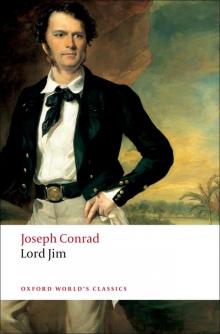 Lord Jim
Lord Jim The Nigger of the Narcissus (Echo Library)
The Nigger of the Narcissus (Echo Library) Victory (Dover Thrift Editions)
Victory (Dover Thrift Editions) Secret Agent
Secret Agent Nostromo
Nostromo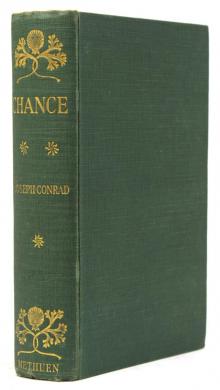 Chance: A Tale in Two Parts
Chance: A Tale in Two Parts Youth
Youth Almayer's Folly
Almayer's Folly The Heart of Darkness and the Secret Sharer
The Heart of Darkness and the Secret Sharer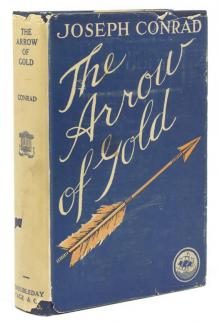 The Arrow of Gold: A Story Between Two Notes
The Arrow of Gold: A Story Between Two Notes The Rescue: A Romance of the Shallows
The Rescue: A Romance of the Shallows The Point Of Honor: A Military Tale
The Point Of Honor: A Military Tale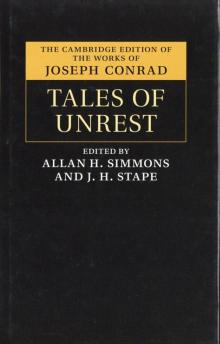 Tales of Unrest
Tales of Unrest Under Western Eyes
Under Western Eyes Gaspar Ruiz
Gaspar Ruiz A Set of Six
A Set of Six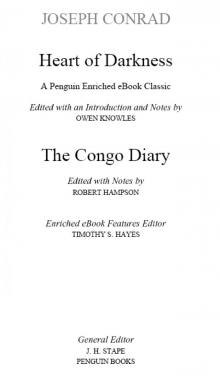 Heart of Darkness and the Congo Diary (Penguin Classics)
Heart of Darkness and the Congo Diary (Penguin Classics) Heart of Darkness and Selected Short Fiction
Heart of Darkness and Selected Short Fiction Typhoon
Typhoon Youth, a Narrative
Youth, a Narrative Tomorrow
Tomorrow The Arrow of Gold
The Arrow of Gold The Shadow Line: A Confession
The Shadow Line: A Confession The Rescue
The Rescue Victory (Echo Library)
Victory (Echo Library) The Brute
The Brute Romance
Romance A Personal Record
A Personal Record Lord Jim: A Tale
Lord Jim: A Tale Heart of Darkness and Selected Short Fiction (Barnes & Noble Classics Series)
Heart of Darkness and Selected Short Fiction (Barnes & Noble Classics Series) Within the Tides
Within the Tides The Secret Sharer and Other Stories
The Secret Sharer and Other Stories Falk
Falk Heart of Darkness and The Secret Sharer
Heart of Darkness and The Secret Sharer Chance
Chance An Anarchist
An Anarchist The Secret Agent: A Simple Tale
The Secret Agent: A Simple Tale The Secret Agent
The Secret Agent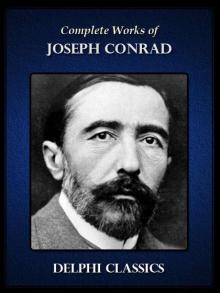 Complete Works of Joseph Conrad (Illustrated)
Complete Works of Joseph Conrad (Illustrated)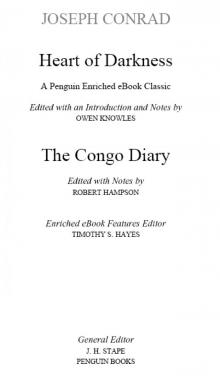 Heart of Darkness and the Congo Diary
Heart of Darkness and the Congo Diary Notes on Life & Letters
Notes on Life & Letters Typhoon (Single Story)
Typhoon (Single Story)